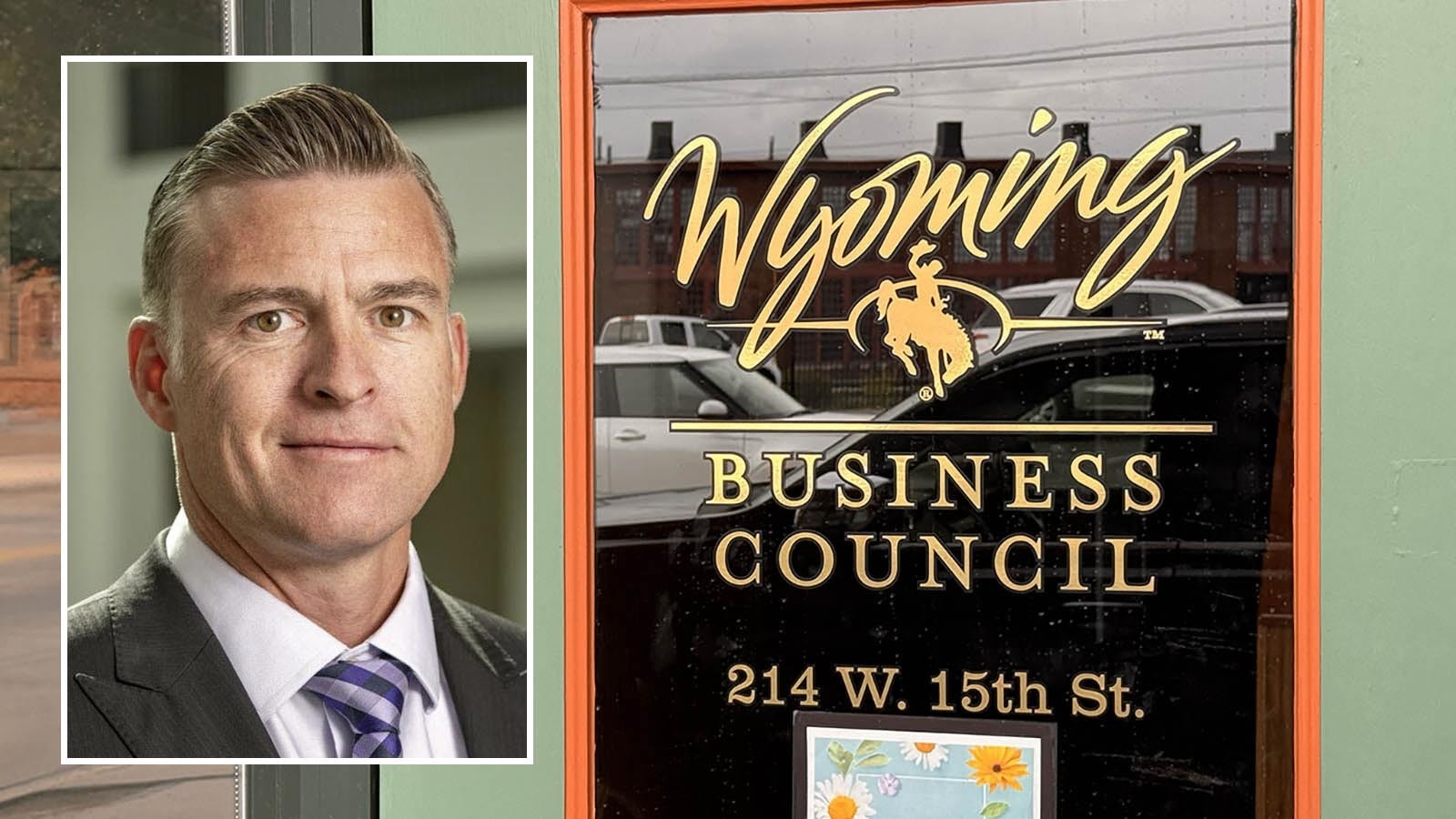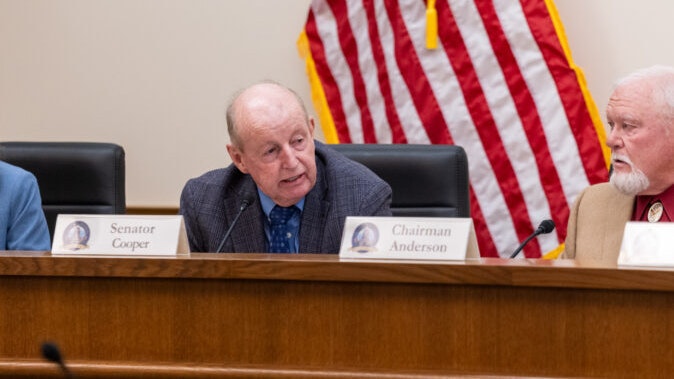A Wyoming House committee advanced a bill on Wednesday that would make the Wyoming Attorney General an elected position.
Currently, the AG in Wyoming is a position appointed by the governor, who serves solely at the pleasure of the governor. Wyoming is one of only seven states that does not elect its attorney general.
House Bill 102 passed on a 6-3 vote in the House Judiciary Committee. State Reps. Daniel Singh, R-Cheyenne, Laurie Bratten, R-Sheridan, Joe Webb, R-Lyman, Marlene Brady, R-Green River, Tom Kelly, R-Sheridan, Jayme Lien, R-Casper, voted in support of the bill. Reps. Art Washut, R-Casper, Ken Chestek, D-Laramie and Lee Filer, R-Cheyenne voted against the bill.
Rep. Scott Heiner, R-Green River, the bill sponsor, believes the attorney general needs to be more directly accountable to the people of Wyoming rather than the governor.
“Ultimately this comes from trusting the voters,” he said. “Trusting the voters to make the right decision.”
The Wyoming Freedom Caucus of which Heiner is a member has had a less than positive relationship with Attorney General Bridget Hill, who was appointed by Gov. Mark Gordon. The Freedom Caucus and Secretary of State Chuck Gray have criticized Hill for either taking too long to file lawsuits or not filing enough.
“How many times have you looked at all these states that are suing on behalf of their states and Wyoming is conspicuously absent?” Heiner questioned.
Freedom Caucus-aligned state legislators also tried to intervene in a lawsuit Hill was fighting to defend the state’s ban on most forms of abortions, partially because they believed her office wasn’t taking aggressive enough action in the case.
The group holds a majority on the House Appropriations Committee, which rejected Gordon’s request to add two attorney positions to Hill’s office. An effort to reconsider this proposal was rejected by the House on Wednesday. Heiner told reporters last week they want outside counsel to pursue certain legal matters.
Heiner’s bill would not go into effect until the 2026 election and would theoretically not impact Hill’s tenure unless the governor decides to try and run for a somewhat unprecedented third term.
Politics And The Law
Chestek, a law professor, was most outspoken against HB 102, saying it will bring unnecessary political decision-making into the AG position.
“The fix is to put more politics in and create a Hydra-headed monster at the top of the state where we’re going to have conflicts between who runs the state, the governor or the attorney general?” Chestek questioned. “I see nothing but problems with that.”
Chestek also brought up the fact that there inevitably would be differences of opinion at times between the AG and governor.
Heiner said that would be a positive and representative of the needs for checks and balances in government. Although he acknowledged politics would at times play a role, he believes electing the AG would still be preferable than continuing the status quo.
Kelly said he sees introducing more politics into the AG position as infusing the position with more will of the people.
Washut disagreed, saying the governor should be the true voice of Wyoming, which he believes an elected AG would undermine.
He also expressed concern that creating a sixth statewide official would lead to tie votes on important decisions. Under HB 102, the elected-AG would not be added to any of the statewide elected boards.
How It Would Work
Under the bill, the attorney general could also serve at the pleasure of the Legislature and Supreme Court as well as the governor but would not be required to do any of their bidding. Currently, the AG works for the governor-only, a status which has existed throughout Wyoming’s statehood.
Chestek also questioned what the governor could do if they needed legal counsel but were at odds with the AG at the time. Heiner did not have an answer readily available but it’s likely they could hire their own legal counsel.
The governor already has this in the form of two staff attorneys in addition to Hill.
One of these attorneys, Betsy Anderson, Gov. Mark Gordon’s deputy chief of staff and general legal counsel, told the committee that Gordon believes the current system works better than having an elected AG.
“We hope the Legislature recognizes the benefits and advantages of having an elected AG,” she said.
Gordon sees an appointed AG as retaining much more independence from politics. Anderson warned that an elected AG may be very reticent to bring legal action against their own campaign donors if warranted. Just because someone is skilled at campaigning does not mean they are as skilled at practicing law, Anderson said.
Washut agreed.
“Who has the most money to get the messaging out there has a big impact on that race,” he said.
Anderson also said the governor would likely have to hire a bigger staff if the AG was an elected position.
Could That Be A Good Thing?
She also said there could be differences between the AG and governor that lead to state policy priorities taking a backseat.
Once again, Kelly said having countering opinions between the AG and governor could be a positive for the state.
Kelly did question what would be in place to prevent the attorney general from being a politically-bought position or from becoming a stepping stone job for governor.
Filer pointed out that clear processes already exist for getting rid of an AG if they fail to do their job duties. With an elected AG, the state would have to wait until the next election cycle. Heiner admitted this is true but pointed out again that under his bill the AG could serve at the pleasure of multiple entities.
Under current law, county attorneys must start an action when directed by the governor, Supreme Court or the Legislature, and that would not change under the bill. Chestek successfully made an amendment to remove this from law, saying it allows the governor to go shopping for attorneys to pursue their agenda.
Gail Symons, a lobbyist with advocacy group Civics307, warned that an elected AG could become politically biased, indebted to their donors and more invested in a future run for governor rather than focusing on law on behalf of the state.
“It erodes the AG’s role as an impartial legal officer focused on the rule of law,” she said.
The majority of other states have elected AGs, but Symons said this can lead to unnecessary political gridlock and division. She pointed to the fact that the U.S. Attorney general is also an appointed position.
“When you turn this into an elected office, legal expertise becomes the least consideration that I think most people would have, it will become about politics,” Symons said. “The current AG, through the governor, represents the people and I think does it very well.”
Singh disagreed, pointing to the fact Gordon formed a political action committee (PAC) in the last election cycle to influence Legislature races that had multiple out-of-state PACs and a high ranking member of the tech industry donate to it.
“By having more positions in the executive branch where individual citizens are able to voice their concerns and where these big PAC donors are not able to funnel their money into one specific candidate, but rather they would have to compete,” Singh said, “I think that actually enfranchises the individuals more in the state of Wyoming.”
Singh said the onus should be on the people of Wyoming to elect a governor that truly represents them, which he believes will correspond to the AG they appoint.
Under current law, if a governor dies or leaves office, the Superintendent of Public Instruction is the sixth in line to temporarily serve in their place. The bill would change this to the AG.
Singh attempted to bring an amendment clarifying that the AG would remain lower in standing than the superintendent in the case of succession, but the committee rejected his motion.
Leo Wolfson can be reached at leo@cowboystatedaily.com.





